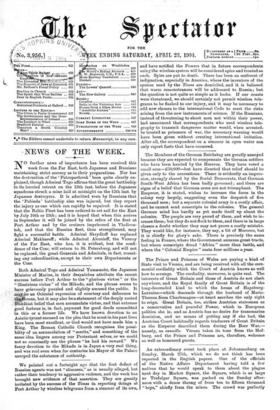Both Admiral Togo and Admiral Yamamoto, the Japanese Minister of
Marine, in their despatches attribute the recent success before Port Arthur to the "glorious virtue" or the "illustrious virtue" of the Mikado, and the phrase seems to have grievously puzzled and slightly amused the public. It xarty,km an Oriental expression of courtesy and deference to bilifir011e, but it may also be a statement of the deeply rooted Bfiddhist belief that men accumulate virtue, and that extreme good fortune is, in fact, payment for good deeds committed in this or a former life. We have known devotion to an Asiatic tyrant excused on the plea that he must in his past lives have been most excellent, or God would not have made him a King. The Roman Catholic Church recognises the possi- bility of an accumulation of "merits," and something of the same idea lingers among our Protestant selves, or we could not so constantly use the phrase "he had his reward." We fancy devotion to the Mikado is in Japan a very real thing, and was real even when for centuries his Mayor of the Palace usurped the substance of authority.
We pointed out a fortnight ago that the first defect of Russian agents was not "slimness," as is usually alleged, but rather their tendency to aggressive violence, and the week has brought new evidence of that assertion. They are greatly irritated by the success of the Times in reporting doings at Port Arthur by wireless telegrams from a steamer of its own, The Prince and Princess of Wales are paying a kind of State visit to Vienna, and are being received with all the cere- monial cordiality which the Court of Austria knows so well how to arrange. The cordiality, moreover, is quite real. The interests of Great Britain and those of Austria do not clash anywhere, and the Royal family of Great Britain is of the long-descended kind to which the house of Hapsburg- Lorraine—which descends through the husband of Maria- Theresa from Charlemagne—at heart ascribes the only right to reign. Great Britain, too, strikes Austrian statesmen as a conservative and peaceful Power, which in European politics she is; and as Austria has no desire for trausmarine dominion, and no means of getting any if she had, the Austrian Court habitually regards traducers of Great Britain as the Emperor described them during the Boer War,— namely, as canaille. Vienna takes its tone from the Hof- burg, and the Prince and Princess are, therefore, welcome as well as honoured guests.










































